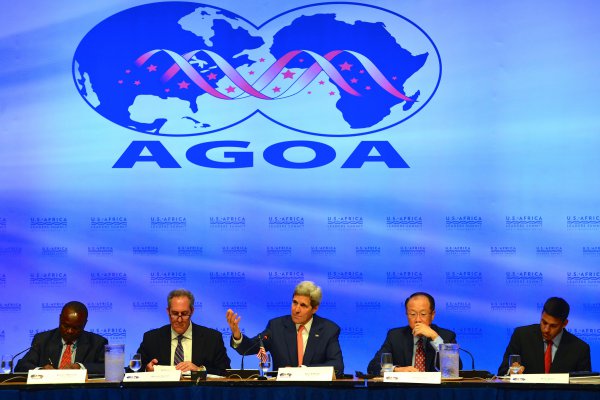U.S. and African officials and business leaders began annual talks today to examine the future of U.S.-Africa trade and investment relations now that the U.S. Congress has reauthorized the African Growth and Opportunity Act for another 10 years. Hosted in Libreville, Gabon, by the governments of both the United States and Gabon, the 2015 AGOA Forum will run through Aug. 27 under the theme, “AGOA at 15: Charting a Course for a Sustainable U.S.-Africa Trade and Investment Partnership.”
AGOA has been the U.S. government’s trade policy with sub-Saharan Africa since 2000, and there seems to be much planned for the next decade. For the most part, observers say, AGOA has been successful in promoting two-way trade, but needs to be opened up to more African countries. At present, 39 African countries are beneficiaries of the policy and its market-access privileges. They collectively account for $4.4 billion in non-oil products entering the United States under AGOA.
In a pre-forum teleconference with reporters, U.S. Assistant Secretary for African Affairs Linda Thomas-Greenfield said the renewal of AGOA for another 10 years was “a clear indication” of Washington’s commitment to promoting prosperity, opening markets, inclusive development, stronger regional integration, and good governance in Africa. “It’s a signal that businesspeople can and should invest with confidence in Africa. As we celebrate AGOA’s reauthorization, the future of U.S.-Africa trade post-AGOA remains a top priority within the interagency and will be the focus of this year’s AGOA Forum,” Thomas-Greenfield added.
Without reauthorization, the legislation would have expired on Sept. 30 this year.
Speaking at the same teleconference, Assistant U.S. Trade Representative Florie Liser said the 10-year extension—the longest in the program’s renewal history—provides certainty for African producers and U.S. buyers about access to the U.S. market under the AGOA program, and creates a stable environment that encourages increased investment in sub-Saharan Africa. With anxiety over AGOA expiring in the near term removed, the forum in Gabon will allow both sides to “begin a more strategic conversation” about taking advantage of new opportunities and mechanisms provided in the renewal legislation, she said.
“There is still much work to be done to take full advantage of AGOA. So we in the U.S. are providing trade capacity building and other technical assistance, and we really look forward to engaging with our African partners when we get to Libreville to talk about how we move forward implementing AGOA and going beyond AGOA,” Liser said.
The extended AGOA enhances the act’s original rules of origin provision, allowing countries to include the cost of direct processing when they share production with other countries on products exported to the United States, and generally provides more transparency for the program, Liser said. “We now have several reports which we’ll be providing to Congress. We also are having a petition process that has been established under AGOA. So we think that the improvements to AGOA and the extension of AGOA—the long-term extension of AGOA—will allow our African partners to take greater advantage of the program,” she said.
The new AGOA also expands the original focus on textiles, oil, manufacturing, and aircraft to give preferential access to U.S. markets for exports from other sectors, such as footwear, cocoa and cocoa products, various nuts and oils from nuts, and other value-added agricultural products. “We have every confidence that the next ten years of AGOA will allow our African partners to be able to increase their value-added, non-oil products that they ship to us and to be able to compete in the U.S. market in those products,” Liser said.
Africa increasingly is a destination for U.S. investors. Ethiopia, for example, has attracted substantial investment related to AGOA. The program benefits U.S. companies and the United States as a whole, the two U.S. officials agree. “We have found that AGOA—not only does it create jobs in Africa, it also creates jobs in the United States. So it is a two-way benefit program,” Thomas-Greenfield said.
Liser added, “And our exports have increased in terms of sending more of our products to African countries, because as [those countries] develop, as their middle classes expand, they are actually in a better position to purchase products that the U.S. supplies to them.”
Aside from enhanced exports, Africa’s overall competitiveness benefits from the AGOA program, Liser said. “By improving the trade and investment environment in Africa, pushing our African partners to meet AGOA’s eligibility requirements of rule of law, helping them to facilitate trade in the region through agreements like the WTO Trade Facilitation Agreement, we are actually, we think, helping the Africans to be in a better place to take advantage of AGOA. This is something that we’re working in across the continent,” she said.
By way of example she cited the Borderless Alliance in West Africa, whereby “we’re helping them to move trucks across the borders there and to thereby be more competitive in their trade and being able to deliver products out to the global markets and to participate more effectively in global supply chains.”
Asked whether AGOA was created to counter China’s deep trade and investment inroads into Africa, Thomas-Greenfield pointed out that AGOA existed long before China became active on the continent. “Remember, we’ve already had fifteen years of AGOA. We have another ten years going forward. Our relationship with Africa on the trade side has been one that has been a long relationship, it has been a relationship that has been mutual, and it has been a relationship that I think has encouraged the Chinese to become more active on the continent of Africa.”
Beyond AGOA, Thomas-Greenfield said, the United States will need to work with Africa on its prosperity agenda in order to create opportunities for the next generation. In many African countries, between 50 percent and 75 percent of the population is under the age of 35. “It’s really important that, as we help to build these economies, we partner with African governments so that this next generation feels vested in the future and they see opportunities available to them in the future,” she noted.













